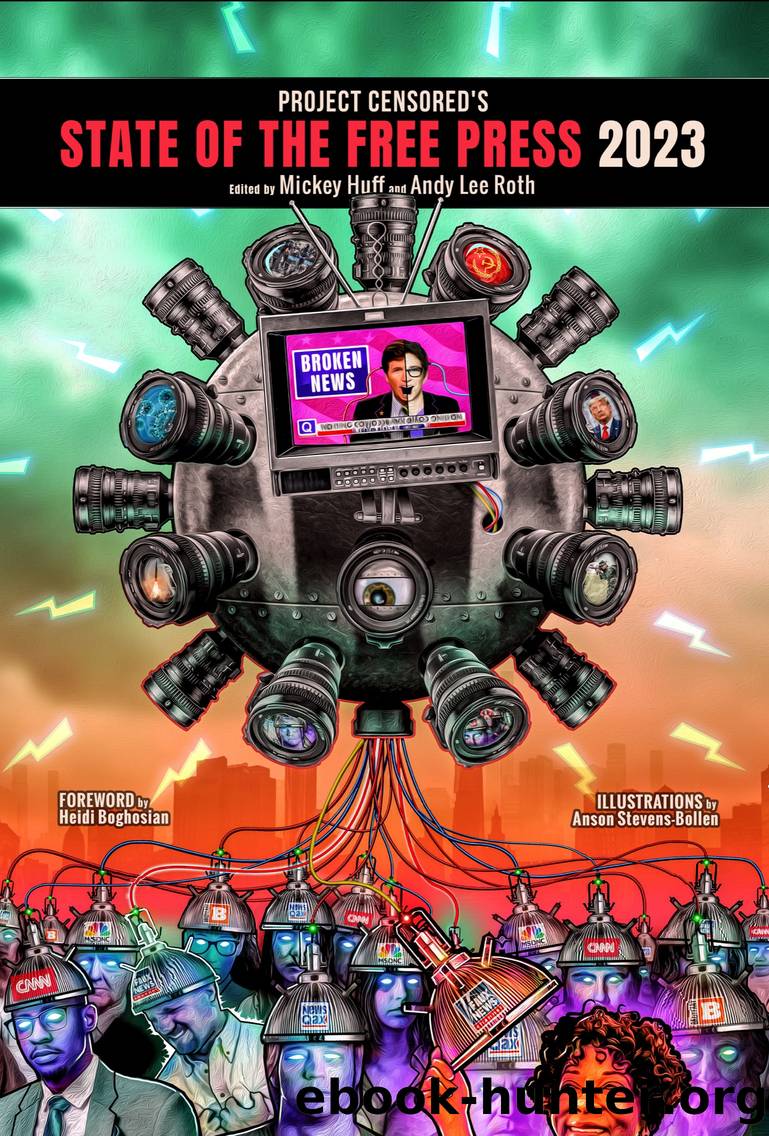Project Censored's State of the Free Press 2023 by Mickey Huff & Andy Lee Roth

Author:Mickey Huff & Andy Lee Roth [Mickey Huff & Andy Lee Roth]
Language: eng
Format: epub
Tags: american politics; US politics; voting rights; labor rights; climate crisis; critical media; critical media literacy; social justice; sociology; journalism; democracy; human rights; environmental rights; alternative media; current events; anthology; project censored; cultural studies; media studies; media literacy; censorship; political science; government; sociology books; propaganda; geopolitics; political philosophy; international politics; political science books; history; history books; political books; politics; media
ISBN: 9781644212387
Publisher: Seven Stories Press
Published: 2022-11-10T18:00:00+00:00
Censored 2001 #15
Gerber Uses the WTO to Suppress Laws that Promote Breastfeeding
Peter Montague, âCorporate Rights vs. Human Need,â Environment and Health Weekly, November 18, 1999.
Muddassir Rizvi, âMilking Profits in Pakistan,â Multinational Monitor, September, 2000.
Student Researchers: Deanna Battaglia and Nathalie Manneville (Sonoma State University)
Faculty Evaluators: Suzanne Toczyski and Linda Novack (Sonoma State University)
Included in Censored 2001 was a report about Gerberâs effort to stifle a Guatemalan law encouraging mothers to breastfeed. As birth rates have dwindled in developed countries, baby formula makers have compensated by aggressively marketing their goods to women in the Global South. However, Guatemalaâs new law would have made it substantially harder for baby formula companies such as Gerber to peddle misleading information about their products.
In 1983, the Guatemalan government passed a series of regulations, slated to go into effect beginning in 1988, to better inform new mothers about the benefits of breastfeeding and risks associated with breast-milk substitutes. For example, formula manufacturers were not allowed to send out free samples or use images of âhealthy, chubbyâ babies on their packaging. Most importantly, companies were prohibited from marketing to mothers in the hospital and were ordered to include disclaimers on product labels saying breast milk was ânutritionally superior.â
By 1988, all domestic and foreign baby food manufacturers except Gerber had agreed to follow the Guatemalan governmentâs new law. Still, Gerber refused to include the breastfeeding note on its labels or to remove the brandâs signature smiling baby from its products. Negotiations between Gerber and the Guatemalan Ministry of Health were ultimately unsuccessful, and Gerber maintained its resistance to the law even after losing its appeal in 1993. When the World Trade Organization (WTO) was established in 1995, Gerber disputed Guatemalaâs law before a WTO tribunal and ultimately won. The Guatemalan government later changed the lawâs language to allow greater flexibility.
Update
Formula sales in the developed world have remained stagnant for years. This is in part due to declining birth rates and decades of compelling scientific research that suggests breast milk prevents a variety of health issues in infants.66 Because of this, the formula industry has tried to expand in undeveloped countries and vulnerable US communities since as early as the 1970s.
After the publication of a 1974 investigative report titled âThe Baby Killer,â which detailed the formula industryâs predatory marketing strategies in developing countries, an international boycott of the major formula producer Nestlé ensued.67 Physicians were increasingly concerned by the companyâs dangerous messaging, which falsely claimed its milk substitutes were just as nutritious as breast milk. The report revealed how Nestlé, and companies like it, targeted poor families by framing baby formula as essential to a âmodernâ way of life. However, when women couldnât afford the rising cost of formula, they watered it down to make their supply last longer, which led to severe malnourishment of their babies.
As a response to the public outcry, the World Health Organization (WHO) rolled out a voluntary code in 1981 in an attempt to permanently stop the marketing of baby formula.68 As a result, Nestlé was unable to promote its formula powder Nan in Mexico, which abided by the WHO code.
Download
This site does not store any files on its server. We only index and link to content provided by other sites. Please contact the content providers to delete copyright contents if any and email us, we'll remove relevant links or contents immediately.
Crazy Rich Asians by Kevin Kwan(9292)
Small Great Things by Jodi Picoult(7143)
Spare by Prince Harry The Duke of Sussex(5197)
Too Much and Not the Mood by Durga Chew-Bose(4348)
Machine Learning at Scale with H2O by Gregory Keys | David Whiting(4313)
Never by Ken Follett(3957)
Harry Potter 02 & The Chamber Of Secrets (Illustrated) by J.K. Rowling(3677)
I'll Give You the Sun by Jandy Nelson(3447)
Fairy Tale by Stephen King(3399)
The Ultimate Backcountry Survival Manual by Aram Von Benedikt; Editors of Outdoor Life;(3266)
Reminders of Him: A Novel by Colleen Hoover(3119)
The Man Who Died Twice by Richard Osman(3079)
Fantastic Beasts and Where to Find Them: Illustrated edition by J.K. Rowling & Newt Scamander(3027)
Will by Will Smith(2920)
The One Memory of Flora Banks by Emily Barr(2863)
Beautiful Disaster 01 by Jamie McGuire(2792)
Harry Potter and the Deathly Hallows (7) by J.K. Rowling(2725)
Never Lie: An addictive psychological thriller by Freida McFadden(2623)
Hooked: A Dark, Contemporary Romance (Never After Series) by Emily McIntire(2554)
